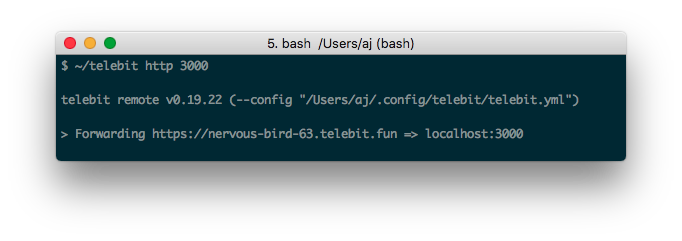| bin | ||
| bin-public | ||
| etc | ||
| examples | ||
| lib | ||
| scripts | ||
| tests | ||
| usr/share | ||
| var | ||
| .gitignore | ||
| build-all.go | ||
| CHANGELOG.md | ||
| LICENSE | ||
| package-lock.json | ||
| package.json | ||
| README.md | ||
Telebit™ Remote | a Root project
Because friends don't let friends localhost™
| Telebit Remote | Telebit Relay | sclient |

Break out of localhost.
If you need to get bits from here to there, Telebit gets the job done.
Install Telebit Remote on any device - your laptop, raspberry pi, whatever - and now you can access that device from anywhere, even securely in a web browser.
How does it work? It's a net server that uses a relay to allow multiplexed incoming connections on any external port.
Features
- Show your mom the web app you're working on
- Access your Raspberry Pi from behind a firewall
- Watch Netflix without region restrictions while traveling
- SSH over HTTPS on networks with restricted ports or protocols
- Access your wife's laptop while she's on a flight
Examples
You do this:
curl -fsSL https://get.telebit.io | bash
You get this:
~/telebit http 3000
> Forwarding lucky-duck-42.telebit.cloud => localhost:3000
~/telebit http ~/sites/example.com/
> Serving ~/sites/example.com/ as lucky-duck-42.telebit.cloud
And this:
~/telebit tcp 5050
> Forwarding telebit.cloud:1337 => localhost:5050
And even this:
~/telebit ssh auto
> Forwarding ssh telebit.cloud -p 1337 => localhost:22
> Forwarding ssh+https (openssl proxy) => localhost:22
No privileged ports. No sudo. End-to-end encryption.
Fastest way to test a site, share a file, and pair over ssh.
Install
Mac & Linux
Open Terminal and run this install script:
curl -fsSL https://get.telebit.io | bash
What does the installer do?
- install Telebit Remote to
~/Applications/telebit/ - symlink the executable to
~/telebitfor convenience - create the appropriate system launcher file
/etc/systemd/system/telebit.service~/Library/LaunchAgents/cloud.telebit.remote.plist
- create local user config
~/.config/telebit/telebit.yml~/.local/share/telebit
Of course, feel free to inspect it before you run it: curl -fsSL https://get.telebit.io
You can customize the installation:
export NODEJS_VER=v10.2 # v10.2 is tested working, but we can test other versions
export TELEBIT_VERSION=master # git tag or branch to install from
export TELEBIT_USERSPACE=no # install as a system service (launchd, systemd only)
export TELEBIT_PATH=/opt/telebit
export TELEBIT_USER=telebit
export TELEBIT_GROUP=telebit
curl -fsSL https://get.telebit.io/ | bash
That will change the bundled version of node.js is bundled with Telebit Relay and the path to which Telebit Relay installs.
Windows & Node.js
- Install node.js
- Open Node.js
- Run the command
npm install -g telebit - Copy the example daemon config to your user folder
.config/telebit/telebitd.yml(such as/Users/John/.config/telebit/telebitd.yml) - Copy the example remote config to your user folder
.config/telebit/telebit.yml(such as/Users/John/.config/telebit/telebit.yml) - Change the email address
- Run
npx telebit initand follow the instructions - Run
npx telebit list
Note: Use node.js v10.2.1
(there are specific bugs in each of v8.x, v9.x, v10.0, and v10.3 that each cause telebit to crash)
Remote Usage
# commands
telebit <command>
# domain and port control
telebit <service> <handler> [servername] [options ...]
Examples:
telebit status # whether enabled or disabled
telebit enable # disallow incoming connections
telebit disable # allow incoming connections
telebit restart # kill daemon and allow system launcher to restart it
telebit list # list rules for servernames and ports
################
# HTTP #
################
telebit http <handler> [servername] [opts]
telebit http none # remove all https handlers
telebit http 3000 # forward all https traffic to port 3000
telebit http /module/path # load a node module to handle all https traffic
telebit http none example.com # remove https handler from example.com
telebit http 3001 example.com # forward https traffic for example.com to port 3001
telebit http /module/path example.com # forward https traffic for example.com to port 3001
################
# TCP #
################
telebit tcp <handler> [servername] [opts]
telebit tcp none # remove all tcp handlers
telebit tcp 5050 # forward all tcp to port 5050
telebit tcp /module/path # handle all tcp with a node module
telebit tcp none 6565 # remove tcp handler from external port 6565
telebit tcp 5050 6565 # forward external port 6565 to local 5050
telebit tcp /module/path 6565 # handle external port 6565 with a node module
telebit ssh disable # disable ssh access
telebit ssh 22 # port-forward all ssh connections to port 22
telebit save # save http and tcp configuration changes
Using SSH
SSH over HTTPS
ssh -o ProxyCommand='openssl s_client -connect %h:443 -servername %h -quiet' lucky-duck-42.telebit.cloud
SSH over non-standard port
ssh lucky-duck-42.telebit.cloud -p 3031
Daemon Usage (non-global)
~/Applications/bin/node ~/Applications/bin/telebitd.js --config ~/.config/telebit/telebitd.yml
Options
~/.config/telebit/telebitd.yml:
email: 'jon@example.com' # must be valid (for certificate recovery and security alerts)
agree_tos: true # agree to the Telebit, Greenlock, and Let's Encrypt TOSes
relay: wss://telebit.cloud # a Telebit Relay instance
community_member: true # receive infrequent relevant but non-critical updates
telemetry: true # contribute to project telemetric data
secret: '' # Secret with which to sign Tokens for authorization
#token: '' # A signed Token for authorization
ssh_auto: 22 # forward ssh-looking packets, from any connection, to port 22
servernames: # servernames that will be forwarded here
example.com: {}
Choosing A Relay
You can create a free or paid account at https://telebit.cloud or you can run Telebit Relay open source on a VPS (Vultr, Digital Ocean) or your Raspberry Pi at home (with port-forwarding).
Only connect to Telebit Relays that you trust.
Check Logs
Linux:
SYSTEMD_LOG_LEVEL=debug journalctl -xef --user-unit=telebit
macOS:
tail -f ~/local/share/telebit/var/log/info.log
tail -f ~/.local/share/telebit/var/log/error.log
Uninstall
Linux:
systemctl --user disable telebit; systemctl --user stop telebit
rm -f ~/.config/systemd/user/telebit.service
rm -rf ~/telebit ~/Applications/telebit
rm -rf ~/.config/telebit ~/.local/share/telebit
macOS:
launchctl unload -w ~/Library/LaunchAgents/cloud.telebit.remote.plist
rm -f ~/Library/LaunchAgents/cloud.telebit.remote.plist
rm -rf ~/telebit ~/Applications/telebit
rm -rf ~/.config/telebit ~/.local/share/telebit
Browser Library
This is implemented with websockets, so you should be able to
LICENSE
Copyright 2016-2018+ AJ ONeal